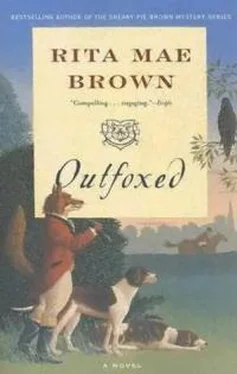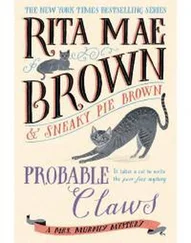“Ma’am?”
“You can’t drown your sorrows. They know how to swim.”
CHAPTER 10
Chickens amused Peter Wheeler. He’d built a sturdy chicken coop with a pitched roof, bought steel broody boxes, and built little ladders for them to perch on when not nestled in the boxes.
He fed them in the mornings, then returned at sundown to count heads, refill the water bucket, pluck eggs from the boxes.
Long ago he ran cattle, kept a few sheep, had hundreds of chickens, and grew hay as well. He’d always kept four horses, since he loved hunting.
Children found their way to Peter. Doug Kinser wound up there. The Lungrun children would come after school, as they desperately needed a happy atmosphere. Children walked over from surrounding farms or hitched rides out from town.
Age wore him down. In his eighties now, Peter had only the chickens left and a well-built harrier named Rooster.
He’d sold his business, a tractor dealership, for quite a bit of money, so his declining years were not attended by that poverty sadly common among the elderly.
He stooped a bit but still had thick wavy white hair plus all his teeth.
Often “his kids” would drive down the country road to visit him. He’d go into town on Wednesdays to see old friends.
Like many old people, he looked forward to chatting with anyone who dropped in.
He heard a truck rumble up to the house.
“Hey,” a familiar voice called out.
“In the henhouse,” he answered.
The door pushed open; Sister hugged him. “You love these damn chickens.” She leaned over. “Hi there, Rooster.”
“Hi.” He wagged his tail.
“Imelda, here”—he lifted up a plump chicken—“has turned into my best layer.” He gave Sister the egg basket.
“Wish it would stop raining.”
“Has been wet.” He handed her about a dozen eggs as he walked down the broody boxes. “I’ve got plenty. You take those home.”
“Thanks.” She reached in, feeling the warm brown eggs. “Peter, has Fontaine contacted you?”
“Wants to buy the place. Crawford, too. The numbers go up and up.”
“Fontaine doesn’t have money anymore. Don’t let him carry you fast.”
“Do I look like a fool?”
“No. In fact, you look quite handsome.”
“Bullshit. Fontaine says he has investors. Crawford has cold hard cash. Both say they want to save the farm from developers. I say they’re both liars of the first water. What do you say?”
“Suspicious.”
“And then some.”
“Good money?”
“Yes. Crawford started at one-point-five million and is up to two-point-seven. Fontaine says to give him until November and he’ll come up with three million.”
“Jesus.”
“For a nature conservancy. I asked for papers, contracts, conservation easements. Crawford had them. Now, sugar pie, they look good, but any decent lawyer will spot the loopholes. Sounds like Wheeler’s Mill Estates to me.” He laughed.
“That’s a lot of money.”
“I’m too goddamned old to enjoy it but I like the action. Used to love to make deals in my youth—my sixties and seventies.”
“Do they know they’re competing?”
“They do.” He laughed louder. “Lord, it’s fun. Those two boys hate each other.” He wrapped his arm around her. “Come on to the house. You look peaked, honey.”
“I was scared you might sell.”
“Come on.”
They went inside, drank a little sherry, and laughed at all the things people know about one another and their community when they’ve lived together a long time.
She checked her watch. “I’d better head out.”
“Janie, I still love you. I want you to know that.”
“I love you, too.”
“Ever wonder what would have happened if we could have married?”
“I’d be feeding chickens.” She laughed, then said, “Life’s strange.”
“It is that.”
The fleeting image of the Grim Reaper jolted Sister. She said, “Peter, if I had to do it all over again I wouldn’t change a thing. You know when Ray Junior died I thought God was punishing me for our affair. Then time passed and I thought differently.”
“God doesn’t punish us for love. Only people do that.”
“Well, I loved you. I’ll always love you. I guess I was a good wife but not a faithful one.”
“You were a good wife. I just wish I’d found you before Ray did. I never hated him. He was too good a man. He had his Achilles’ heel. We all do. But he was a good man.”
“You, too.”
“I guess we took what we could. Maybe that’s all anyone can do.” His voice grew stronger. “My time is coming. I feel well enough but I know my time is coming. I wanted you to know I love you.”
She kissed him good-bye and cried the whole way home.
CHAPTER 11
The rain finally stopped Sunday night. The grays emerged from their den, making straight for the cornfield on the east side of Hangman’s Ridge. The year, rich in gleanings, kept everyone happy.
In a few weeks the young would disperse to find their own territory, their own mates. Males might travel as far as 150 miles. Females usually remained closer to their place of birth.
Butch and Mary Vey had a small litter this year, only four. One little gray male had been carried away by a large hawk its first time out of the den. The other was sickly and died. Inky and Comet, half-grown, stayed healthy. Both parents taught them how to hunt, what to hunt, how to dump hounds, how to cross the road. In preparation for leaving home they now hunted on their own.
Inky traveled to the edge of the cornfield. She’d eaten so much corn, she sat down. A rustling through the corn, not the light wind, made her crouch low.
A huge male red fox appeared, saw Inky, and said, “Oh, it’s you.” Without further conversation he moved on.
Inky sat up and blinked. The red fox, Vulpes vulpes, as he preferred to be called, felt the gray inferior. This particular male, Target, had an especially splashy white tip on his tail. He was easily recognizable to humans, too. He’d been around for years.
Target’s entire family, four kits, also half-grown, were out hunting, as well as his mate, his sister, and her mate. The reds—a numerous, querulous clan—kept themselves busy, so they rarely spoke to anyone else. They feared no one, not even the bobcats, mountain lions, and bears, quite numerous in central Virginia, since the Blue Ridge Mountains provided food and safety.
As to foxhunters and their hounds, not only did the reds have no fear, they delighted in exhausting and then maiming their foe. Few sounds were as lovely to a red’s ears as the sound of a human breaking bones.
If the hounds picked up a gray fox, the reds generally ignored the chase, concentrating on sunning themselves or going into their den and sleeping.
The grays could take care of themselves. They ran in smaller circles than the reds, some of whom might run straight for miles. Grays also perfected a figure eight, a maneuver incorporating sharp turns and practiced dives into other creatures’ dens. This confused the hounds and infuriated the animal receiving the unexpected caller. However, there was little choice but to entertain the gray until the hounds were called off by the huntsman and cast in another direction. Since the grays were smaller than the red fox, they could squeeze into all manner of hiding places. They also climbed trees, a trick the reds thought much too catlike. Reds intensely disliked cats, who competed for the same game but who also sassed them.
The grays weren’t overfond of cats but a feline insult was shrugged off. The reds, proud of their position, felt most animals owed them obeisance.
Inky learned these things from her parents and from experience. She looked overhead as Athena, the large owl, silently glided by. Athena, a deadly hunter, would swoop down, talons outstretched, before her prey knew what hit them.
Читать дальше












